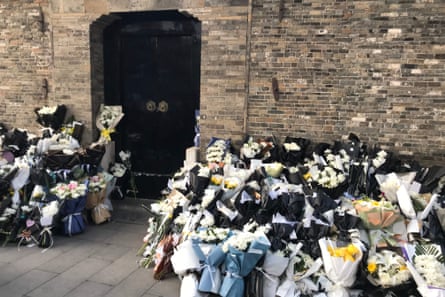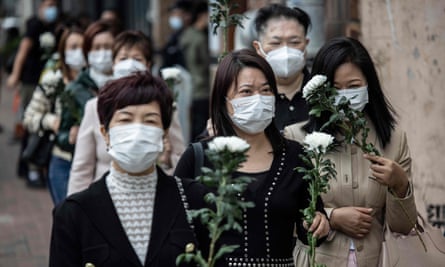Chinese authorities have initiated the highest “emergency response” level of censorship, according to leaked directives, including a crackdown on VPNs and other methods of bypassing online censorship after unprecedented protests demonstrated widespread public frustration with the zero-Covid policy.
The crackdown, including the tracking and questioning of protesters, comes alongside easing of pandemic restrictions, in an apparent carrot and stick approach to an outpouring of public grievances. During an extraordinary week in China, protests against zero-Covid restrictions included criticism of the authoritarian rule of Xi Jinping – which was further highlighted by the death of former Chinese leader Jiang Zemin.
Leaked directives issued to online Chinese platforms, first published by a Twitter account devoted to sharing protest-related information, have revealed authorities’ specific concerns about the growing interest among citizens in circumventing China’s so-called “Great Firewall”. The protests have been strictly censored, but protesters and other citizens have this week used VPNs to access non-Chinese news and social media apps which are banned in China.
The directives, also published and translated by the China Digital Times, a US-based news site focused on Chinese censorship, came from China’s cyberspace administration, and announced a “Level I Internet Emergency Response, the highest level of content management”.
It ordered managers to take a “hands-on approach” and strengthen content management to rapidly identify, deal with and report information about what it termed “offline disturbances” and “recent high-profile events in various provinces”.
“The incident on November 24 triggered expressions of various grievances,” it said, according to CDT’s translation and in reference to the Urumqi building fire which killed 10 people.
“Pernicious political slogans appeared in Shanghai; college and university students held conspicuous political gatherings; smears by foreign media increased; and various websites have strengthened their content management.”
It noted upcoming dates during which managers should take particular care, including the one-week anniversary of the fire, World Human Rights Day, and International Anti-Corruption Day. They also ordered e-commerce platforms to “clean-up” the availability of products and apps and “harmful content” designed to circumvent internet restrictions, like VPNs and firewall-circumventing routers.
Protesters and residents who want to air grievances about the zero-Covid policy or other aspects of life in China have been playing a cat and mouse game with censors this week. The death of 96-year-old Jiang Zemin, announced on Wednesday, provided one avenue for some to creatively express dissatisfaction with Xi.

Jiang left a mixed legacy. Elevated to leader of the Chinese Communist party during the Tiananmen protests and massacre in 1989, Jiang oversaw the subsequent crackdown, as well as repression of Falun Gong practitioners. He also shepherded China out of the international isolation that followed 1989, grew the country’s economy, and led it into greater international participation. He was also much more outwardly expressive, and participatory with media, in stark contrast to the notoriously closed-off Xi.
Under the increasingly authoritarian and globally isolated rule of Xi, young people have in recent years begun to look on the Jiang era more fondly.
More than half a million commenters flooded state broadcaster CCTV’s post on the Twitter-like platform Weibo within an hour of his death being announced, many referring to him as “Grandpa Jiang”.
“Toad, we blamed you wrongly before; you’re the ceiling, not the floor,” said one since-censored comment using a popular and mildly affectionate nickname for Jiang. In retirement, Jiang became the subject of lighthearted memes among millennial and Gen Z Chinese fans, who called themselves “toad worshippers” in thrall to his frog-like countenance and quirky mannerisms.
Some internet users had social media accounts suspended after they shared a song, titled “unfortunately it’s not you”. The word “unfortunately” in Chinese is “ke xi”, while “you” translates to “ni” – a reference to Winnie-the-Pooh which is itself a banned reference to Xi Jinping. Another popular post saw a book about Jiang, titled “He changed China” altered to say “He changed it back”, with “he” a common reference for Xi as naming him in criticism can attract swift punishment.
On Thursday, hundreds of people gathered in Jiang’s home town in the eastern city of Yangzhou to pay their respects to the former Chinese leader on Thursday evening, leaving a thick pile of bouquets around the perimeter of his former residence.
A roadside flower seller said she had “lost count” of the number of chrysanthemums – Chinese funeral flowers – she had sold on Thursday.
Reporters with Agence France-Presse witnessed people queueing to lay them against the grey stone wall of the traditional house, with some bowing and saying brief prayers.
“He was a great, patriotic and positive leader,” Li Yaling, a woman in her late 60s, told AFP in Yangzhou. “We admired him greatly, and feel loss and nostalgia now he’s gone.”
Security personnel at the site politely but firmly moved groups of mourners quickly down the narrow alley past the historic building in an apparent attempt to avoid people gathering. There is a tradition in China of using public mourning gatherings for past leaders to express discontent with the current regime.

In recent days there has been a distinct shift in messaging form officials and state media, regrading the pandemic. Officials appear to have stopped or at least reduced referencing the “dynamic zero Covid” policy by name. Lockdowns have lifted in major cities, even where relatively high case numbers are still being reported. The lower severity of Omicron compared to previous virus strains is being publicly discussed and emphasised for the first time.
Commentaries in the official state news outlet, Xinhua, on Friday urged greater individual responsibility around mask-wearing, hand washing, ventilation, and reduced gatherings. They also emphasised the need to protect vulnerable groups, and for local authorities to be faster at re-opening targeted lockdowns.
“Given that risks can be managed, what should be managed must be managed well, and there should also be relaxation when appropriate,” it said according to a translation by China analyst Bill Bishop.
Additional research by Chi Hui Lin
Stay connected with us on social media platform for instant update click here to join our Twitter, & Facebook
We are now on Telegram. Click here to join our channel (@TechiUpdate) and stay updated with the latest Technology headlines.
For all the latest Covid-19 News Click Here
